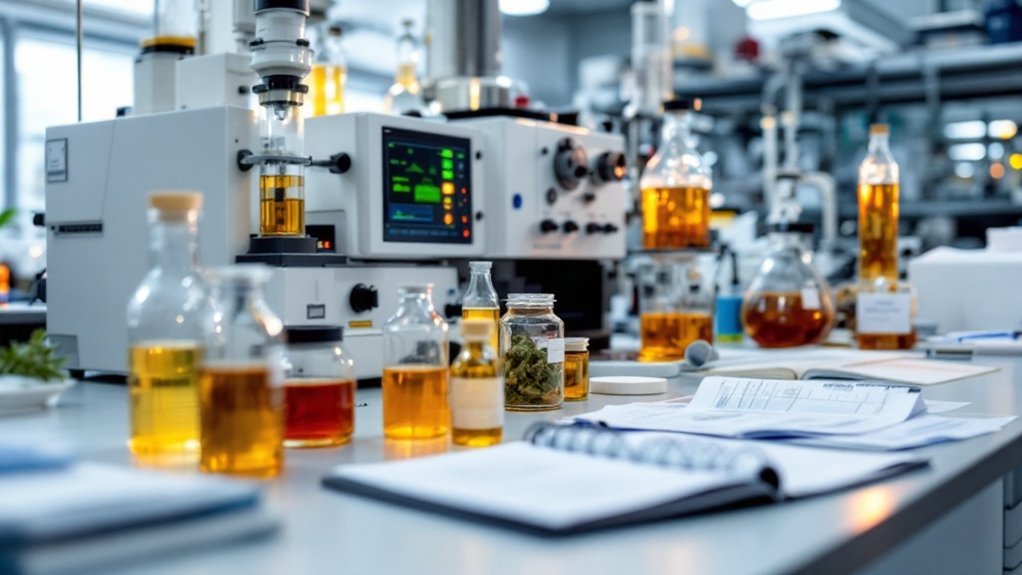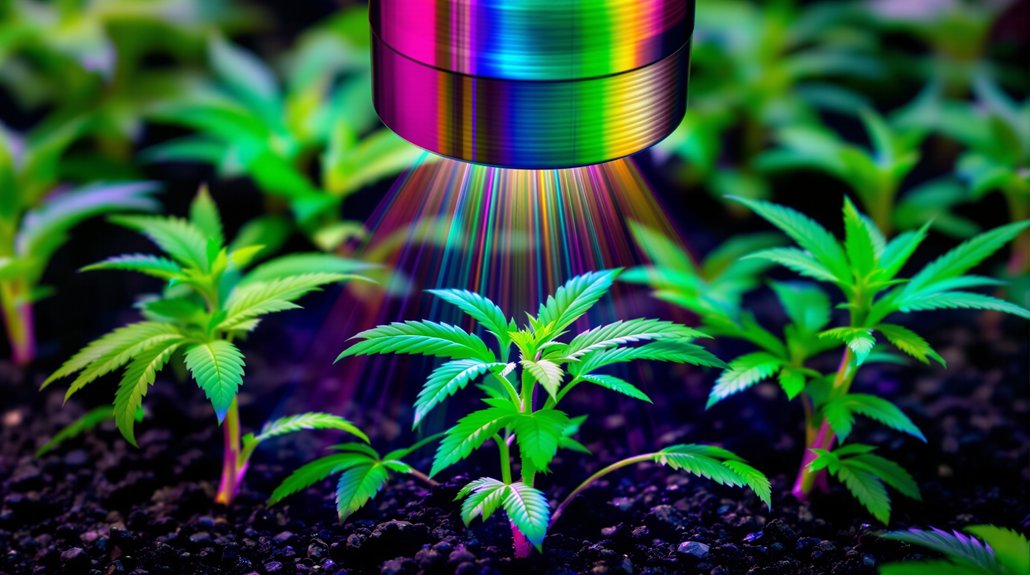The cannabis chemistry field offers diverse career paths with competitive salaries ranging from $18-$60 per hour. Entry-level positions include laboratory technicians performing routine testing, while specialized roles encompass analytical chemists, extraction specialists, and quality assurance technicians. Research and development opportunities attract professionals with advanced degrees who develop novel applications for cannabis compounds. Compliance experts verify products meet regulatory standards through extensive documentation. The industry’s projected growth creates promising prospects for chemistry professionals seeking to apply their expertise in this evolving sector.

The rapidly evolving cannabis industry has created numerous career opportunities for individuals with backgrounds in chemistry and laboratory sciences. With salaries ranging from $18 to $60 per hour and hundreds of marijuana chemistry positions available nationwide, this sector presents promising prospects for chemistry professionals. Job growth in the cannabis industry is projected to continue to expand, making it an attractive field for those with appropriate qualifications and interests.
The cannabis industry offers lucrative opportunities for chemistry professionals with competitive salaries and significant projected growth.
Laboratory technician positions represent common entry points into cannabis chemistry careers. These roles involve routine testing and analysis of cannabis products using specialized equipment to examine various cannabis compounds. While these positions typically require basic chemistry knowledge and laboratory experience, they provide valuable exposure to the industry’s technical aspects.
Quality assurance technicians ascertain products meet established regulatory standards, an essential function in this highly regulated market.
Analytical and bio-analytical chemist roles constitute more specialized positions within the field. Analytical chemists concentrate on testing cannabis for potency, contaminants, and overall quality, while bio-analytical chemists explore the biological interactions of cannabis compounds. These positions typically demand advanced degrees in chemistry or related disciplines and command higher compensation within the cannabis chemistry sector.
Extraction specialists and technicians form another vital career path. These professionals operate specialized equipment to isolate specific compounds from plant material using methods such as CO2, ethanol, and hydrocarbon processes. Due to the hazardous materials involved, extraction roles often require safety training and certification.
Extraction specialists develop protocols aimed at maximizing both yield and purity of cannabis extracts.
Quality assurance and compliance positions focus on making sure cannabis products meet health standards while adhering to state and federal regulations. These roles involve extensive documentation, reporting, and maintenance of quality control systems. Professionals in this area perform regular audits of production processes and bridge the gap between scientific requirements and legal compliance. Most graduates acquire hundreds of hours of laboratory experience during their degree programs, making them well-prepared for these regulatory roles.
Research and development opportunities attract those interested in advancing cannabis science. R&D chemists investigate new extraction methods and product innovations, while field application scientists develop novel applications for cannabis compounds. These positions typically require higher education credentials and specialized experience, offering the chance to contribute to the medicinal applications of cannabis while working at the forefront of this expanding industry.
Frequently Asked Questions
What Certifications Enhance Employability in Cannabis Testing Laboratories?
Key certifications for cannabis testing employability include ISO/IEC 17025 training, analytical chemistry credentials (HPLC, GC-MS), and microbiological testing certifications.
Good Laboratory Practices (GLP) knowledge demonstrates regulatory compliance understanding.
Specialized training in contaminant testing for heavy metals, pesticides, and mycotoxins is highly valued.
State-specific cannabis laboratory requirements, proficiency testing experience, and quality management system certifications further enhance a candidate’s marketability in this growing scientific field.
How Does Salary Compare to Traditional Chemistry Careers?
Cannabis chemistry salaries generally align with traditional chemistry careers, though with some variations.
Entry-level cannabis positions ($47,000-$50,000) compare similarly to traditional chemistry technician roles. Mid-level cannabis chemists ($62,000-$79,000) earn comparable wages to traditional analytical chemists.
Higher-level positions like Cannabis Laboratory Directors ($98,400) match or occasionally exceed traditional chemistry management roles.
Regional differences greatly impact compensation in both fields, with cannabis chemistry offering competitive advancement opportunities despite being a newer industry sector.
Are There Remote Work Opportunities in Cannabis Chemistry?
Remote opportunities in cannabis chemistry have grown considerably, especially in data analysis, quality assurance, and regulatory compliance roles.
Research positions such as Chemist, Scientist, and Associate can be performed remotely with proper digital infrastructure. While bench chemistry remains primarily in-person, documentation, technical writing, and analytical reporting often shift well to remote work.
Scientific consulting, protocol development, and R&D project management are increasingly available as remote contract positions using cloud-based collaboration tools and laboratory information management systems.
Which States Offer the Most Cannabis Chemistry Positions?
Based on current job data, California leads the nation in cannabis chemistry positions with the highest number of overall cannabis jobs at 78,618.
Michigan, Florida, Illinois, and Massachusetts follow as significant markets for chemistry-specific roles.
States with recent rapid industry growth like Missouri (110% increase) and New York (103% increase) are creating new laboratory positions.
Indeed.com and ZipRecruiter listings indicate concentrations of cannabis chemistry jobs in these established markets, particularly for analytical and formulation chemists.
Do Cannabis Chemistry Jobs Require Security Clearances or Background Checks?
Most cannabis chemistry positions require background checks rather than formal security clearances.
In Canada, analytical testing and research labs have fewer requirements, though the Responsible Person in Charge needs security clearance.
Background checks typically screen for drug trafficking, corruption, or violent crime convictions.
U.S. positions follow stricter protocols due to federal cannabis prohibition, where any cannabis use typically disqualifies individuals from obtaining federal security clearances, regardless of state legalization status.









